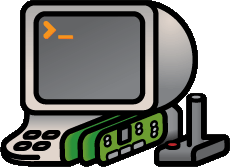|
What kind of platforms are you talking about?
Computing platforms, the sort that are the basis for video games, artworks, and other digital media developments. The series is not exclusively about "platform games" or "platformers" such as Super Mario Bros., and is not about political platforms. It is also not about rail or oil platforms, although books in the series will be designed to be conveniently read in a variety of locations, including such platforms.
Hey, there's no such thing as a platform. What do you say to that?
A platform is a perspective on parts of a computing system, not an inherent quality of some system or parts of it. To someone who is porting Linux to the Dreamcast, the Dreamcast is the platform. To someone developing the scripting language Lua on Linux, Linux is the platform. To someone writing a program in Lua, Lua is the platform. It's true, therefore, that platforms do not exist in the way that a hard drive or a binary file does. They are, however, an essential way that computing systems are compartmentalized, abstracted, and managed by developers.
Is the Web a platform? World of Warcraft? Second Life? LambdaMOO?
The clearest case of a computing platform is a foundational system that supports more or less general-purpose computing: a mainframe, minicomputer, or microcomputer running a particular operating system; a programming language; or a video game console or handheld. Some systems may be communication platforms or simply very large-scale computing systems, but may not be best understood as computing or new media platforms because they do not mainly support the development of artifacts.
At any rate, as the previous question explains, something is only a platform when a developer considers it as such. The more important question is, are there interesting platform studies to be done of the Web or of multi-player virtual environments? There certainly may be.
Isn't there already a bunch on the Web about how to program the Atari 2600 and stuff?
There is, and it is well worth reading and referring to. The Platform Studies books will not duplicate or repackage such information. Instead, they will explain how the technical make-up of the Atari VCS/Atari 2600 (and other platforms) has influenced the development of games, art, literature, music, and other expression. These books will describe and investigate hardware and software systems in detail, but will also critically consider digital media work and how it has been made.
|



